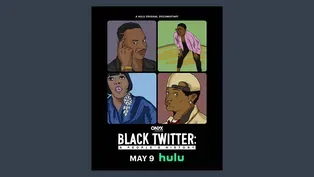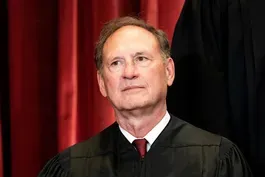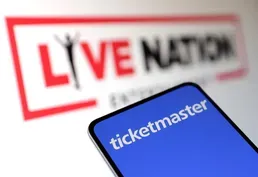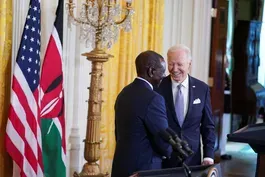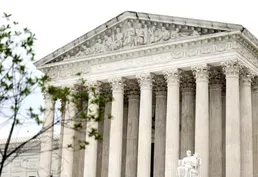
U.S. may allow Ukraine to use American weapons inside Russia
Clip: 5/23/2024 | 9m 44sVideo has Closed Captions
U.S. may lift ban on Ukraine using American-supplied weapons to strike inside Russia
Ukraine is desperately trying to hold off a new Russian offensive that threatens its second-largest city. U.S. officials tell the NewsHour that the administration is debating whether to lift a restriction on the use of American weapons to target Russian weapons in Russia. Nick Schifrin discussed that with former U.S. Ambassador to Ukraine William Taylor and Emma Ashford of the Stimson Center.
Problems with Closed Captions? Closed Captioning Feedback
Problems with Closed Captions? Closed Captioning Feedback
Major corporate funding for the PBS News Hour is provided by BDO, BNSF, Consumer Cellular, American Cruise Lines, and Raymond James. Funding for the PBS NewsHour Weekend is provided by...

U.S. may allow Ukraine to use American weapons inside Russia
Clip: 5/23/2024 | 9m 44sVideo has Closed Captions
Ukraine is desperately trying to hold off a new Russian offensive that threatens its second-largest city. U.S. officials tell the NewsHour that the administration is debating whether to lift a restriction on the use of American weapons to target Russian weapons in Russia. Nick Schifrin discussed that with former U.S. Ambassador to Ukraine William Taylor and Emma Ashford of the Stimson Center.
Problems with Closed Captions? Closed Captioning Feedback
How to Watch PBS News Hour
PBS News Hour is available to stream on pbs.org and the free PBS App, available on iPhone, Apple TV, Android TV, Android smartphones, Amazon Fire TV, Amazon Fire Tablet, Roku, Samsung Smart TV, and Vizio.
Providing Support for PBS.org
Learn Moreabout PBS online sponsorshipGEOFF BENNETT: Welcome to the "NewsHour."
Russian missiles struck Kharkiv in Ukraine's east today, killing at least seven civilians.
Ukraine is desperately trying to hold off a new Russian offensive that threatens Ukraine's second largest city.
And U.S. officials tell the "PBS NewsHour" that the administration's is debating whether to lift a restriction on the use of American weapons to target Russian weapons in Russia.
Nick Schifrin starts our coverage.
NICK SCHIFRIN: In the smoky aftermath of a Russian missile, firefighters pick through the pieces of Russia's latest battlefield of choice, books, books turned to ash in what was one of Ukraine's largest printing houses.
Russia has been bombarding Kharkiv and trying to occupy towns further north, including Vovchansk, to try and bring Kharkiv city into artillery range and draw Ukrainian forces away from fierce fighting in the Donbass.
In Vovchansk, there's no cover from Russian drones.
The city center has been ripped apart by Russian weapons parked right over the border inside Russia.
Newly arrived Western ammunition has helped Ukrainian troops hold the line.
But they can't use U.S. weapons to hit the Russian weapons in Russia that are hitting them.
This week, President Volodymyr Zelenskyy told Reuters wants that restriction lifted.
VOLODYMYR ZELENSKYY, Ukrainian President (through translator): We are negotiating with partners so that we can use their weapons against buildups of Russian equipment on the border and even on their territory.
So far, there is nothing positive.
NICK SCHIFRIN: The United Kingdom has provided long-range Storm Shadow missiles and so far the only public Western endorsement of Zelenskyy's request.
DAVID CAMERON, British Foreign Secretary: It is their decision about how to use these weapons.
We don't discuss any caveats that we put on, on those things.
NICK SCHIFRIN: Ukraine also wants NATO planes inside NATO airspace to fire into Western Ukraine, so Ukraine can transfer its own air defense assets east.
VOLODYMYR ZELENSKYY (through translator): When Russian missiles are flying, Polish planes are sent up, but they don't shoot down Russian missiles?
Can they do this?
I'm sure, yes.
NICK SCHIFRIN: Senior U.S. officials tell me, while the idea of using NATO assets to shoot down Russian missiles over Ukraine is deemed too risky, there is a debate about whether to allow Ukraine to use American weapons to target Russian weapons just over the border inside Russia.
And The New York Times today reported Secretary of State Antony Blinken has now endorsed that idea.
So, should the U.S. lift restrictions on where Ukraine can fire American weapons?
For that, we get two views.
William Taylor was U.S. ambassador to Ukraine during the George W. Bush administration.
And Emma Ashford is a senior fellow at the Stimson Center and writes widely about U.S. foreign policy.
Thanks very much.
Welcome, both of you, back to the "NewsHour."
Ambassador Taylor, let me start with you.
Should the U.S. allow Ukraine to use American weapons against Russian targets in Russia, whether on the ground in Russia or in the air above Russia, not only on the border, but deeper inside Russia?
WILLIAM TAYLOR, Former U.S.
Ambassador to Ukraine: Nick, I'd say yes.
If the Russians are firing at Ukrainians from a sanctuary, which is really what they have right now, then the Ukrainians ought to be able to shoot back.
This is basic self-defense.
And some of the Russian fire is coming from close by, close across the border in that sanctuary, but some is coming from airfields.
So there are Russian jets that are taking off from airfields and that are launching these glide bombs that are going into Kharkiv, as you just described.
So, yes, I think the Ukrainians ought to be able to shoot back.
NICK SCHIFRIN: Emma Ashford, do you think the Ukrainians should be able to shoot back, again, with U.S. weapons?
EMMA ASHFORD, Stimson Center: I think that we need to be drawing a distinction here.
I think, when it comes to Kharkiv and the question of a conventional conflict that is being fought effectively across the border, that is one thing.
And I think that's something that the United States might want to look at lifting some of those restrictions.
Where I have substantially more concerns, however, is on this long-range strike capability.
Ukraine has been using other non-American weapons to engage in a campaign of striking Russian refineries, factories, et cetera.
And I worry, and I think the White House is very worried, that allowing Ukraine to use U.S. weapons to do that would be very escalatory.
NICK SCHIFRIN: So, Bill Taylor, that distinction, you guys both agree that perhaps U.S. weapons should be used against, for example, Russian artillery parked right on the border that are attacking Vovchansk.
But the concern, as Emma Ashford puts it, that it could escalate if you allow the strikes to go further, what's your response to that?
WILLIAM TAYLOR: So, I think the Russians have escalated in conventional terms as much as they can.
I mean, there's nothing -- they're not holding back.
They're using everything they have got.
They're not using nuclear weapons, and they probably won't.
Probably won't.
There are all kinds of reasons why they wouldn't.
But they -- there's no room now for escalation.
And Emma's right.
The Ukrainians are shooting deep with their own drones.
Those drones are not strong.
They are not heavy.
They can't do real damage to airfields.
If they're very good and very precise, they can do some damage to an airplane.
But these weapons -- and Emma's also right.
The Brits have already allowed them to use these Storm Shadows.
And nothing happened.
I think we should let them do that.
NICK SCHIFRIN: What about that point, Emma Ashford, that the Brits changed the red line, so to speak, and nothing happened, Russians didn't respond, and that Russia is at the kind of cap of its ability to escalate?
EMMA ASHFORD: So whether or not we agree that it should be the case, I think the Russians very much do see a difference between the United States doing something and European countries doing something.
When it comes to the idea that the Russians cannot escalate any further, I'm much more skeptical on that.
We talk a lot about the nuclear question, but that's not really the concern here.
We're talking about potential sabotage that we're starting to see in Western European states.
There was a fire in Poland just this week that was attributed potentially to Russian agents.
We're talking about potential escalation to a broader Russian-NATO war, something that comes across the border.
So I think we are telling ourselves very convenient untruths when we say that the Russians don't have any means to escalate against us.
NICK SCHIFRIN: Bill Taylor, can Russia escalate against NATO directly, whether conventionally or, as Emma Ashford points out, in the hybrid ways that they have done for years?
WILLIAM TAYLOR: Deterrence works, Nick.
Deterrence has worked.
The Russians -- Mr. Putin is not suicidal.
He knows that, if he attacks NATO, he loses.
He loses quickly and devastatingly.
That's deterrence.
That deterrence is there.
It's also deterrence when Jake Sullivan made it very clear more than a year ago that, if the Russians thought about using tactical nuclear weapons in Ukraine, there would be catastrophic consequences.
Those words were well thought out.
That was not a throwaway line from Jake Sullivan, catastrophic consequences.
That's deterrence, and I think it works.
NICK SCHIFRIN: And Xi Jinping, in fact, actually threatened Putin about nuclear weapons.
But, Emma Ashford, bottom line, do you think Russia is deterred?
EMMA ASHFORD: I think Russia is deterred from direct attacks on NATO territory, but I do think we're seeing an increasing willingness to escalate kind of under that level of conventional conflict.
And I do just want to note that I think we need to put this question of long-range strikes in the context of the other steps that the U.S. and Western allies have taken, increasing the number of weapons systems that have been sent, increasing the ways in which Ukraine can fight back against Russia, and then talking about things like U.S. advisers in the conflict or Western troops behind the lines.
These are things that sort of move forward in a consistent upward cycle of escalation, and, at some point, it is entirely possible that we could cross some Russian red lines.
So we do have to be very cautious, and I credit the White House for being cautious on this.
NICK SCHIFRIN: I want to zoom out in about the minute-and-a-half that I have left.
So, you each have about 45 seconds to answer this question.
How does this war, do you believe, end?
WILLIAM TAYLOR: It depends on us.
It depends on us.
As Emma just said, if we can provide a lot of weapons to the Ukrainians so that they can push, they can stabilize the line right now, and then eventually next year, probably, they can push them back.
If it's clear that the Ukrainians are not going to stop fighting, which it is, and if it's clear the Europeans will continue to support the Ukrainians, which they are so far, and we have just demonstrated that we're going to supply them with $61 billion and more, presumably, after that, if that is clear to President Putin that he cannot win, that's how it ends.
NICK SCHIFRIN: Emma Ashford, 45 seconds?
NICK SCHIFRIN: And can Putin be convinced that he can't win?
And, therefore, should the West get to the point where Ukraine can win?
EMMA ASHFORD: I am not convinced that this is sustainable for five or seven years or whatever long-term we're talking about, but I do believe that the Ukrainians with the Western help that's already committed can deny the Russians additional gains and convince Putin that he cannot achieve anything else on the battlefield, and that is the point at which you start looking for a negotiated settlement.
So that's how I think we finally do start to move towards a settlement in this conflict.
NICK SCHIFRIN: Emma Ashford, Ambassador Bill Taylor, thank you very much to you both.
WILLIAM TAYLOR: Thank you, Nick.
'Black Twitter' documentary explores its cultural impact
Video has Closed Captions
'Black Twitter' documentary explores its history and cultural impact (7m 36s)
College leaders grilled over handling of campus protests
Video has Closed Captions
College leaders grilled by lawmakers in hearing over handling of campus protests (5m 2s)
Controversial flag flown at Alito's beach house, report says
Video has Closed Captions
Flag associated with Christian nationalism flown at Alito's beach house, report says (6m 44s)
DOJ files antitrust suit against Ticketmaster, Live Nation
Video has Closed Captions
Ticketmaster, Live Nation a monopoly that should be broken up, Justice Department alleges (6m 23s)
Invasive goldfish threaten Great Lakes ecosystem
Video has Closed Captions
How massive, feral goldfish are threatening the Great Lakes ecosystem (6m 6s)
News Wrap: U.S. to designate Kenya as a major non-NATO ally
Video has Closed Captions
News Wrap: Biden plans to designate Kenya as a major non-NATO U.S. ally (5m 3s)
Supreme Court rejects South Carolina gerrymandering claim
Video has Closed Captions
Supreme Court rejects racial gerrymandering claim in South Carolina (5m 27s)
Providing Support for PBS.org
Learn Moreabout PBS online sponsorshipSupport for PBS provided by:
Major corporate funding for the PBS News Hour is provided by BDO, BNSF, Consumer Cellular, American Cruise Lines, and Raymond James. Funding for the PBS NewsHour Weekend is provided by...
